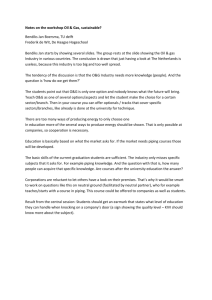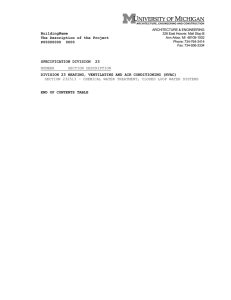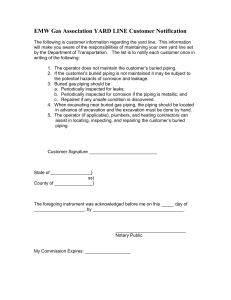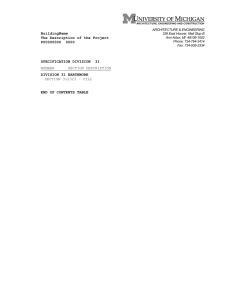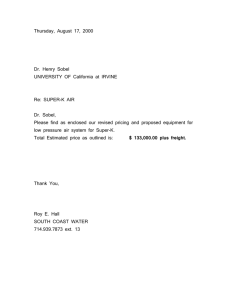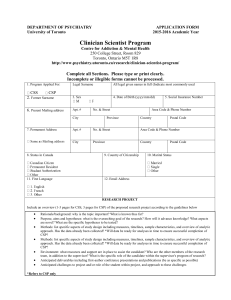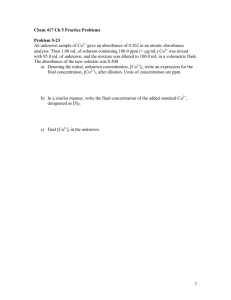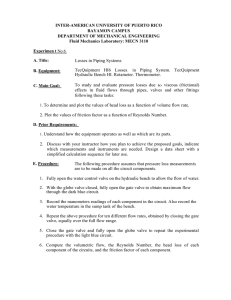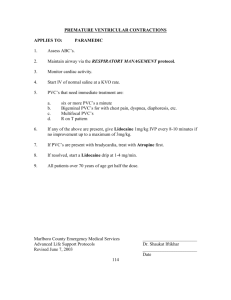division 23 heating, ventilating and air conditioning (hvac)
advertisement
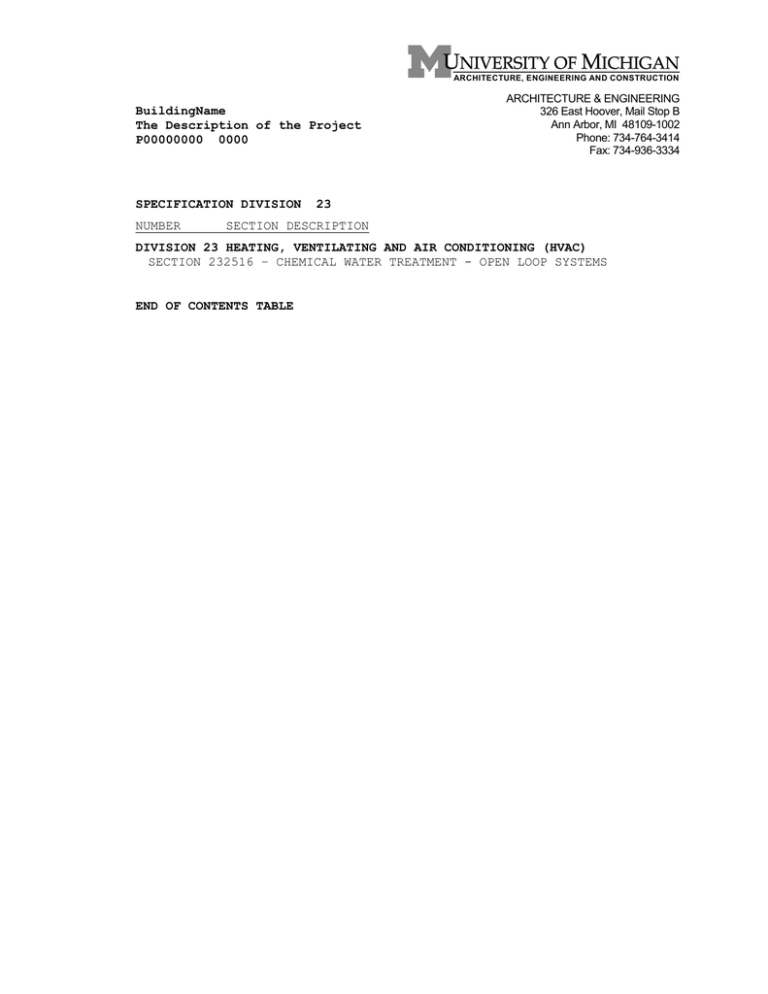
_______________________________________ ARCHITECTURE, ENGINEERING AND CONSTRUCTION BuildingName The Description of the Project P00000000 0000 DOCUMENTS SPECIFICATION DIVISION NUMBER ARCHITECTURE & ENGINEERING 326 East Hoover, Mail Stop B Ann Arbor, MI 48109-1002 Phone: 734-764-3414 Fax: 734-936-3334 23 SECTION DESCRIPTION DIVISION 23 HEATING, VENTILATING AND AIR CONDITIONING (HVAC) SECTION 232516 – CHEMICAL WATER TREATMENT - OPEN LOOP SYSTEMS END OF CONTENTS TABLE DIVISION 23 HEATING, VENTILATING AND AIR CONDITIONING (HVAC) SECTION 232516 – CHEMICAL WATER TREATMENT - OPEN LOOP SYSTEMS PART 1 - GENERAL 1.1 RELATED DOCUMENTS A. Drawings and general provisions of the Contract, Standard General and Supplementary General Conditions, Division 1 Specification Sections, and other applicable Specification Sections, in particular the Related Sections listed below, apply to this Section. B. Related Sections: 1. 2. 3. 4. 5. 6. 7. 1.2 A. Section Section Section Section Section Section Section 019110/019100 - Commissioning 220500 - Common Work Results for Mechanical 221113 - Piping Materials and Methods 220523 - Valves 220553 - Mechanical Identification 230900 – Mechanical Systems Controls 26 – Electrical SUMMARY Products for chemical water treatment systems specified in this section include the following: 1. 2. 3. 4. 5. 6. 7. 8. 9. 10. 11. 12. Chemical Inhibitors and Biocides for Water Motor Operated Ball Valves Chemical Feed Pumps Bromine Feeder Tank Chemical Treatment Controller with Conductivity Probe and flow switch. Corrosion Coupon Rack Solid Corrosion Inhibitor Dissolver Clear Plastic Strainers Flow Indicators Ball Valves Injection Quill Assembly Chemical Solution Tubing B. Provide a Chemical Services Provider (CSP) to perform the services described below. C. Provide water treatment products and services including: 1. 2. 3. Chemicals for cleaning, passivation, and treatment of each system. On-going treatment, chemicals, testing, certification, and reports to demonstrate effective water treatment is maintained at all times. Start-up and operation of chemical treatment equipment. P00000000 BuildingName The Description of the Project 0000 Issued for:BID 232516 – 1 D. Provide a complete chemical water treatment program during construction for all new and reused piping networks. This program shall begin from the point each system is filled during construction and extend until Substantial Completion or final Owner acceptance of each system, whichever occurs later. The program shall include water analysis, chemicals, testing, equipment, consulting and service for the following systems: 1. Chilled Water Condenser Water System E. Attend project meetings as required to plan, schedule and coordinate above activities with other project contractors and the Owner. F. Provide recommended testing procedures and chemical treatment schedule for Owner's personnel. This information shall be submitted to the owner in a Program Administration Manual. 1.3 A. SUBMITTALS Product Data: Include rated capacities; water-pressure drops; shipping, installed, and operating weights; and complete data on furnished products listed below: 1. 2. 3. 4. 5. 6. 7. 8. 9. 10. 11. 12. 13. 14. 15. 16. Product specifications and MSDS’s for each chemical used Cleaning Procedures Passivation Procedures Chemical Treatment Procedures Motor Operated Ball Valves Chemical Feed Pumps Bromine Feeder Tank and Piping Kit Chemical Treatment Controller with Conductivity Probe Corrosion Coupon Rack Solid Corrosion Inhibitor Dissolver Clear Plastic Strainers Flow Indicators Ball Valves Injection Quill Chemical Solution Tubing PVC back-board B. Schematic diagram of the water treatment system showing the arrangement of all components and piping connections. C. Project specific wiring diagram reflecting wiring between all devices and connections to Owner’s monitoring system. D. Details regarding the construction, support, and arrangement of devices on the PVC back-board. E. Submit resume of water treatment personnel and name of Chemical Services Provider. 1. Provide a current copy of CSPs State of Michigan Commercial Pesticide Applicators Category 5B certification. F. Service Reports as indicated under Part 2 below. G. Sequence of Operation: Provide a written sequence of operation detailing the operation of the chemical treatment system. H. Program Administration Manual. P00000000 BuildingName The Description of the Project 0000 Issued for:BID 232516 – 2 I. Passivation Confirmation Report(provide when passivation is specified): Verify passivation of galvanized-steel surfaces, and confirm this observation in a written report to the Architect and Construction Manager. J. Shop Drawings to include detailed equipment assemblies indicating dimensions, weights, loads, required clearances, method of field assembly, components, and the location and size of each field connection as necessary to assist the mechanical contractor with proper system installations. 1.4 QUALITY ASSURANCE A. Manufacturers and Products: The manufacturer listed as the “Basis of Design” establishes the standard of quality that shall be provided for the Work. Subject to compliance with all requirements indicated and the features provided by the Basis of Design, provide specified products from the manufacturers named in Part 2. B. Products in this section shall be built, tested, and installed in compliance with the specified quality assurance standards; latest editions, unless noted otherwise. 1. 2. American Society for Testing and Materials (ASTM) a. D859 – Test Method for Silica in Water b. D1067 – Test Methods for Acidity/Alkalinity in Water c. D1068 – Test Methods for Iron in Water d. D1126 – Test Method for Hardness in Water e. D4012 - Test Method for Adenosine Triphosphate (ATP) Content of Microorganisms in Water f. D5465 - Practice for Determining Microbial Colony Counts from Waters Analyzed by Plating Methods NFPA 70 National Electric Code C. CSP shall be currently certified by the State of Michigan for Commercial Pesticide Application Category 5B. D. Chemicals shall comply with all Federal, State and Local/Municipal requirements as defined by the governing agencies. E. Conform to all applicable Codes, Regulations, and Municipal requirements for the use and disposal of chemicals (including cleaning compounds) and waste to public sewer systems. 1. 2. 3. Wastewater shall be discharged to the sanitary sewer only if it has a pH between 5.0 and 10.0 and meets the requirements of the City of Ann Arbor Sewer Use Ordinance. For wastewater not meeting such criteria, contact U-M Occupational Safety and Environmental Health (OSEH) Hazmat at 734-763-4568 for proper disposal instructions. City of Ann Arbor Sewer Use Limitations can be found at the following Ann Arbor City website: http://www.municode.com/resources/gateway.asp?pid=11782&sid=2 2 or by contacting U-M OSEH Environmental Protection & Permitting Program (EP3) at 734-936-1920. Contact U-M OSEH HazMat at 734-763-4568 for special disposal requirements and proper disposal instructions. P00000000 BuildingName The Description of the Project 0000 Issued for:BID 232516 – 3 4. 1.5 Wastewater containing any chemical or sediment is prohibited from discharge to the storm water system. No chemical shall contain Chromates or Inorganic Phosphates. DELIVERY, STORAGE, AND HANDLING A. Package for delivery to best protect finished surfaces while using the least amount of single-use packaging as possible. Deliver equipment and components adequately packaged for lifting, skidding, or rolling into final position, according to manufacturer's instructions. If possible, package and ship products using reusable blankets and fabrics, or reusable cardboard and crate systems. B. Store materials and equipment raised off the floor on pallets and protected with coverings to prevent damage due to weather and construction activities. Store in areas that prevent damage due to freezing and extreme temperatures or sunlight. Arrange coverings to provide air circulation to avoid damage from condensation or chemical build-up. Protect from damage, dirt and debris at all times. C. Store chemicals in curb protected area. Such secondary containment areas must have the capacity to hold the volume of the largest container or 10% of the combined containers, whichever larger. If room has no floor drains, then the room itself may be considered sufficient secondary containment. If the room is considered the secondary containment ensure there is a lip at the door so no liquids can exit the room in the event of a leak. Verify field conditions before storing any chemicals 1. 1.6 A. 1.7 A. Provide temporary containment areas when permanent containment areas do not exist. Remove temporary containment at the end of construction. WARRANTY Provide a complete warranty for parts and labor for a minimum of one year from the date of Substantial Completion. This warranty does not include ongoing chemical treatment or monitoring. ACCEPTABLE CHEMICAL SERVICE PROVIDERS (CSP) Approved CSPs 1. 2. 3. 4. 5. 6. 7. Chemtreat Crown Solutions GE Water Kroff Mitco Nalco Rochester Midland P00000000 BuildingName The Description of the Project 0000 Issued for:BID 232516 – 4 PART 2 - PRODUCTS 2.1 A. GENERAL CSP Services: 1. 2. 3. 4. The CSP shall provide all cleaning and treatment chemicals, basic services (including set-up and programming of all water treatment control devices), testing, equipment and materials necessary for a complete water treatment program. The CSP shall perform an analysis of the supply water to determine the type and quantities of chemical treatment needed to maintain the required water quality to prevent corrosion, scaling, and biological growth. The CSP will at minimum provide weekly site visits to verify proper water treatment after any system or part of a system is treated. Weekly visits shall be conducted to assure performance requirements are being met, analyze water samples, inspect equipment, and adjust feed rates as required to maintain proper water treatment, and continue until final written Owner acceptance of the respective system. At each site visit CSP shall analyze each system for corrosion inhibitors, pH, total iron, total copper, bacteria levels (provide analytical laboratory analysis monthly) and conductivity; inspect loss from corrosion coupons (provide analytical laboratory analysis monthly), record make-up meter readings, and perform any other tests necessary to validate that corrosion, scale, and organic growth is being prevented. Reports: a. Submit a written startup test report for each system placed into service. b. A service report shall be prepared on site by the CSP, submitted at the time of each service visit (with copies immediately provided to the Owner and Commissioner), which shall include all required test results and recommendations. c. Additionally, provide final reports for approval to the Owner and Commissioner regarding each site service visit, certified by an Officer of the CSP, within one week of any water treatment activity. Such reports shall include the results of any field or lab tests. Reports shall clearly state if the required water quality and maximum corrosion rates are being achieved. d. At a minimum, each report shall include the following information (levels shall be reported in ppm unless noted otherwise): 1) System Treated 2) Date 3) Conductivity (microsiemens) 4) pH 5) Total Iron 6) Total Copper 7) Coupon Corrosion Rates (monthly analytical laboratory analysis) 8) Make-up Water Quantity Since Last Visit 9) Corrosion Inhibitor Level 10) Silica Level P00000000 BuildingName The Description of the Project 0000 Issued for:BID 232516 – 5 11) 12) 13) 14) 15) 16) 17) 18) 19) 5. 6. 7. 2.2 Biocide Level "P" Alkalinity Free "OH" Alkalinity Chemical Oxygen Demand Total Suspended Solids (TSS) Ammonia Calcium Carbonate Hardness Calcium Carbonate Alkalinity Microbiological in organisms/mL (monthly analytical laboratory analysis) a) Total Aerobic Plate Count b) Total Anaerobic Plate Count c) Nitrate Reducers d) Sulfate Reducers e) Iron Bacteria Conduct final on-site system turn over meeting with Owner and Commissioner. Present final validation report demonstrating that performance requirements have been achieved and that each system is currently properly treated. When required by Part 3, train Owner's maintenance personnel in water treatment procedures. Program Administration Manual: a. The CSP shall provide the Owner with two (2) Program Administration Manuals including sections covering program control, testing requirements, in plant logs, safety data and system information. Each section shall include the following: 1) Program Control: Include a complete program outline with chemical descriptions, control ranges, and required action for “out of range” situations. Also include complete ordering instructions with applicable account numbers and phone numbers. 2) Testing Requirements: This section will include basic testing practices as well as detailed test instructions for each test to be performed. 3) Sequence of operation detailing the operation of the chemical treatment system. 4) In-Plant Logs: Include detailed testing log sheets for each system to be tested including room to record one (1) month’s data on one (1) sheet and a section to log chemical inventory. 5) Safety Data: Include the CSP’s 24-hour toll free safety hotline number as well as MSDS sheets for each chemical used. 6) System Information: Include any equipment manuals and related information. TREATMENT PROGRAM – FLUSHING AND CLEANING A. Cleaning chemicals shall be non-phosphate and non-acidic. B. Flush and clean all new and reused piping. C. Provide a flush/clean plan for approval. Provide and later remove all temporary bypasses, drains, vents, etc. required to flush and clean the system. Temporary components for flushing and cleaning are not indicated on the drawings. P00000000 BuildingName The Description of the Project 0000 Issued for:BID 232516 – 6 D. Flush and clean systems per the general procedures specified in Related Sections; clean systems per the approved cleaning procedures submitted under this specification section. Provide and install all required cleaning chemicals. E. Verify that adequate cleaning chemical was added and that cleaning was effective. Test that cleaning chemicals were properly rinsed from the system. Provide a report certifying that cleaning and rinsing, was properly executed. F. Provide chemical treatment immediately after each system has been cleaned and flushed. Systems shall not stand filled with fluids for periods longer than 48 hours without beginning flushing and cleaning of the system, which shall then be immediately followed by the chemical treatment procedures. 2.3 CHEMICAL TREATMENT - GENERAL A. Provide passivation and chemical treatment per the submitted and reviewed chemical treatment procedures and Program Administration Manual and to maintain the Performance Requirements. B. Chemically treat new and reused piping networks using chemicals and treatment procedures compatible with the system being cleaned and the chemical treatment chemicals in existing piping systems being connected to. Test existing piping systems or otherwise determine chemical treatment in existing piping and validate compatibility. D. When connecting into active existing systems, treat piping networks installed or reused by the project and verify by lab analysis that the treatment levels per the treatment plan have been attained prior to connecting into the existing active system. Submit validating report for approval. 1. 2. Do not connect into existing active system until report is approved by Owner. Provide temporary valves, piping, and accessories as required to treat the project’s piping prior to connection to the active system. E. Provide chemical treatment program at system startup or immediately upon operation of a system for temporary cooling, whichever comes first. F. Provide chemical treatment immediately after the system has been cleaned and flushed. Immediately thereafter, begin the approved water treatment maintenance program to passivate and prevent corrosion, scale, and organic growth and to maintain treatment chemical levels. G. Chemical inhibitors for open loop chemical systems shall be polymer based without molybdenum as a corrosion inhibitor and contain azole in an amount appropriate for the percentage of internal copper surface area of the system piping. Provide products with PTSA (p-Toluenesulfonic acid) florescent tracer dyes. Molybdenum shall not be used as a tracer. H. Use 1" halogenated isocyanurate bromine tablets for biological control. P00000000 BuildingName The Description of the Project 0000 Issued for:BID 232516 – 7 I. No chemicals shall contain chromates or inorganic phosphates. J. Adjust chemical concentrations as required to achieve the required performance. 2.4 PERFORMANCE REQUIREMENTS A. The water treatment programs proposed by the CSP shall maintain corrosion rates below 0.5 mils per year for mild steel and 0.1 mils per year for copper. These rates shall be verified with corrosion coupons provided by the CSP. Coupons shall be analyzed in the CSP’s analytical laboratory monthly, or more often if required, to assure these levels are not exceeded. B. Microbiological growth levels shall be maintained below 10,000 cfu’s aerobic bacteria and 10 cfu’s anaerobic bacteria. The CSP shall perform detailed microbiological culturing at the CSP’s company’s analytical laboratory monthly, or more often if required, to assure these levels are not exceeded C. The Langelier Stability Index shall be maintained to not exceed 2.50. 2.5 EQUIPMENT - GENERAL A. Provide all components required for a fully operational water treatment system. Provide components that are not adversely affected by the treatment chemicals employed, and that are rated for the maximum pressures and temperatures that may be encountered by the treatment system. B. Refer to the condenser water treatment equipment detail for additional equipment requirements. 2.6 A. MOTOR OPERATED BALL VALVE: Acceptable Manufacturers: 1. 2. 3. Belimo (Basis of Design) Siemens Johnson Controls B. 120 VAC, on/off control, normally closed/fail closed/spring return, full port ball valve, 1 inch size with NPT female ends. C. Forged Brass, nickel plated body, stainless steel ball and stem, PTFE seals and lubricated O-ring packing. Rated for minimum 200 PSI at 212°F. D. 200 PSI close-off pressure rating, capable of operation at differential pressures up to 30 PSI. E. Actuator with visual position indicator, manual hex crank valve over-ride, and conduit fitting for electrical connection. F. Valve and actuator shall also comply with the requirements for ball style control valves in Related Section “Mechanical Systems Controls”. P00000000 BuildingName The Description of the Project 0000 Issued for:BID 232516 – 8 2.7 A. CHEMICAL FEED PUMP Acceptable Manufacturers: 1. 2. 3. Pulsatron Series E Plus model LPB4 (Basis of Design) Grundfos LMI-Flomotion B. Nominal capacity of 1.00 GPH (24 GPD) at 100 PSIG. C. 120 VAC/60 HZ/1 PH with minimum 6 foot long three prong grounded plug. UL or ETL approved for indoor and outdoor use. D. Reproducibility +/- 2% at maximum capacity. E. It shall be possible to manually adjust the stroke rate and stroke length via an adjustment means located on the pump body. Provide the following minimum adjustment ranges: 1. 2. Stroke rate turn down ratio 10:1 Stroke length turn down ratio 10:1 F. It shall also be possible to start and stop the pump via an external mechanical or solid state relay contact. G. Provide hand-off-auto switch, circuit protection, and solenoid thermal overload protection with automatic reset. H. Pump shall be constructed of glass filled polypropylene (GFPPL), with Teflon diaphragm. Fittings, bleed valve, injection valve, and foot valve shall be GFPPL. Fittings shall accommodate 1/4” to 3/8” I.D. tubing. Provide guided check valves with ceramic balls and Teflon seats and o-rings. With bleed valve for priming. 2.8 A. BROMINE FEEDER TANK Acceptable Manufacturers: 1. Neptune Chemical Pump Company model BT (Basis of Design) B. Vinylester resin body tank, minimum capacity of 20 gallons. 4 inch top opening with threaded, gasketed closure. Two threaded side connections and one threaded bottom connection, all 1 inch NPT. Maximum tank diameter 18 inches. C. Tank rated 150 PSI at 150°F. D. Provide with accessory piping kit to include inlet diffuser/strainer fitting and exit strainer fitting. 1. 2. 3. E. 2.9 A. All accessories to be rated 150 PSI at 73°F All components, including manufacturer, shall comply with the requirements of the related articles in this specification section. Unions shall have buttress threads. All materials shall be compatible with a 20% bromine solution at a pH of 5.0-7.5. All seals shall be Viton, PTFE, or FKM. CHEMICAL TREATMENT CONTROLLER WITH CONDUCTIVITY PROBE Acceptable Manufacturers: 1. Pulsafeeder “Microvision” model MVS1PB (Basis of Design) P00000000 BuildingName The Description of the Project 0000 Issued for:BID 232516 – 9 B. Multi-function chemical treatment controller for controlling inhibitor feed, biocide feed, and bleed (blow-down). Complete with toroidal conductivity sensor assembly and back-board for mounting of indicated chemical treatment devices. UL, CSA or ETL listed. C. Controller features shall include: 1. 2. 3. 4. 5. 6. 7. 8. 9. 10. 11. 12. 13. 14. 15. 16. 17. D. Toroidal sensor assembly features shall include: 1. 2. 3. 4. 2.10 A. Acceptable Manufacturers: A. All components, including manufacturer, shall comply with the requirements of the related articles in this specification section. SOLID CORROSION INHIBITOR DISSOLVER Acceptable Manufacturers: 1. 2. B. Advantage Controls Model ACR (Basis of Design) Cannon Water Technology J.L. Wingert Vector Industries 3/4” diameter Schedule 80 PVC coupon rack with two coupon holders, flow indiactor, and a 1/4” sample tee with valve. Provide mild steel and copper coupons. 1. 2.11 No exposed electrodes Temperature compensated With in/out ball valves, strainer, injection tee, and rail. Rated minimum 125 PSI at 122°F CORROSION COUPON RACK: 1. 2. 3. 4. B. Polypropylene enclosure rated NEMA 4X Pre-wired 15 ft. power cord and pigtails for 115 VAC. Large LCD display with statistics screen 0–9,999 μS/cm setpoint range Battery backup Password protection Selectable timer Flow switch to make controller inoperative when no flow is detected. Rated minimum 125 PSIG at 122°F. Water meter inputs: dry contact and Hall Effect types Three drum level detection inputs (opened/closed relay type detection) Dual biocide output relays Inhibitor output relay Bleed output relay Dry contact alarm relay output All relay outputs rated for 2 amps Conductivity output: 4-20 mA isolated analog output PVC back-board for mounting the controller with PVC chemical feed pump shelf attached to the back-board. Solv-Ultima Model 150 (Basis of Design) Hydro Systems Company Model 590 Rated for 1.2 GPM minimum, and 100 PSIG at 100°F. P00000000 BuildingName The Description of the Project 0000 Issued for:BID 232516 – 10 C. Constructed of chemical resistant parts molded of polypropylene and polyethylene. D. Back-up reservoir and float for overflow protection. E. Pressure regulator adjustable between 20-40 PSIG. F. Pressure gauge and removable filter. G. Atmospheric siphon breaker for backflow prevention. 2.12 A. STRAINERS- CLEAR PLASTIC Acceptable Manufacturers: 1. 2. 3. B. 2.13 A. Clear PVC y-strainer rated 150 PSI at 73°F, with removable basket. With 8 mesh (0.094 inch opening) stainless steel screen. FLOW INDICATORS Acceptable Manufacturers: 1. 2. 3. B. 2.14 A. Spears Manufacturing Hayward Nibco Blue White model F-440 (Basis of Design) King Instrument GF Signet Variable area flow meter, 0-10 gpm (conductivity loop) 5-21 gpm (brominator loop) nominal range, rated 150 psig at 68°F, with graduated polysulfone or acrylic cylinder, with an accuracy of +/5%. Rod guided float with stainless steel rod. Provide 3/4 inch pipe size union end connections. PVC BALL VALVES Acceptable Manufacturers: 1. 2. 3. Spears Manufacturing Hayward Nibco B. True union PVC ball valve rated 200 PSI at 73°F. Full port, PTFE ball seat, peroxide cured EPDM seals, polypropylene handle, buttress threaded union nuts. C. Ball valves downstream of the brominator shall be provided with Viton or FKM seals. 2.15 A. RETRACTABLE INJECTION QUILL ASSEMBLY Acceptable Manufacturers: 1. 2. Saf-T-Flo Water Services Inc. EB-159 (Basis of Design) Hydro Instruments P00000000 BuildingName The Description of the Project 0000 Issued for:BID 232516 – 11 B. Injection quill assembly allowing retraction under pressure consisting of 1-1/2 inch brass stop (ball valve) and compression gland, 1 inch diameter sch. 80 PVC solution tube with 45 degree bevel end, check valve, and 1 inch braided PVC hose assembly. All seals shall be Viton or FKM accept as noted. 1. 2. 3. 4. 5. 6. 2.16 A. 2.17 A. All components shall be rated for 150 PSIG working pressure at 100°F. All bromine wetted materials shall be compatible with a 20% bromine solution at a pH of 5.0-7.5. With 1 inch male inlet connection, 1-1/2 inch male main connection, brass solution tube adapter and packing nut, stainless steel restraint hook, and stainless steel restraint chain. Restraint chain length shall be selected by the manufacturer to allow closure of the stop before withdrawal of the solution tube. Check valve: Diaphragm style with PVC body, FKM diaphragm, and union nut body. Plast-O-Matic Series CKM. May be provided separate from quill assembly. Mount on solution tube inlet, at downstream end of PVC hose. Solution tube length shall project into the pipe for a distance equal to 1/3 the diameter of the pipe. Provide braided PVC hose length adequate to allow solution tube retraction. Provide stainless steel hose clamps and PVC fittings to allow quill, hose, and pipe connections. PIPING AND MISCELLANEOUS COMPONENTS Provide per Related Sections. For components at or downstream of the brominator, provide with Viton, PTFE, or FKM seals. CHEMICAL SOLUTION TUBING Chemical solution tubing for connection to suction and discharge of chemical feed pump and inhibitor dissolver: 1. Opaque polyethylene tubing rated minimum of 125 PSIG from 50°F to 140°F. Provide polypropylene or stainless steel threaded, compression, or other positive locking style fittings of equivalent rating as required for connection to pump, inhibitor vessel, and rigid piping. Push-on “barbed” style fittings shall not be used. PART 3 - EXECUTION 3.1 EXAMINATION AND PREPARATION A. Pre-Treatment Conference: Prior to treatment activities, meet with the Project Engineer, Commissioner and contractors to verify treatment procedures, discuss coordination with existing piping networks, and to coordinate treatment activities with construction schedule. B. Flush and clean systems per Related Sections and Part 2 above. P00000000 BuildingName The Description of the Project 0000 Issued for:BID 232516 – 12 C. 3.2 Examine roughing-in for equipment support, piping, and electrical connections to verify actual locations, sizes, and other conditions affecting equipment performance, maintenance, and operations. Proceed with installation only after unsatisfactory conditions have been corrected. INSTALLATION A. Install all required components per manufacturer's recommendations and per Related Sections and chemically passivate, treat, and maintain the system per the requirements of Part 2. B. Use and dispose of chemicals and wastewater (including from existing piping networks) per the Quality Assurance section of this specification. All costs of disposal shall be borne by the contractor. C. Install equipment at locations shown on the Drawings. D. Provide all chemicals and all incidental components. E. Provide union connections at inlet and outlet to the bromine feed tank. F. Make piping connections between dissimilar-metal piping with dielectric fittings per Related Sections. G. Provide electrical components in conformance with Related Section. H. Provide interconnecting control wiring for chemical treatment controls and sensors per Related Section 230900. I. Rigidly support PVC piping at injection quill assembly to prevent pipe movement when operating the isolation valve upstream of the hose connection. Support the quill hose with a hanger that does not abrade the hose surface. Verify that all components at and downstream of the brominator are equipped with the specified seals. Install quill in a location easily accessible for quill removal. Do not mount quill in bottom of pipe. Provide caution label, per detail. J. Mount sensors, meters, and all other required components. K. Passivate and chemically treat each system immediately after it has been cleaned and flushed. L. The treatment program shall begin at system start-up or immediately upon first operation of the system by the contractor for temporary use, whichever comes first. Continue the program until Substantial Completion of the system. FIELD QUALITY CONTROL 3.3 A. The CSP shall: 1. 2. Verify that systems and equipment have been properly cleaned, flushed, and filled with water, and are fully operational before introducing operational chemicals for water-treatment systems. Introduce and maintain chemical treatment to achieve the specified performance requirements. P00000000 BuildingName The Description of the Project 0000 Issued for:BID 232516 – 13 3. 4. 5. 6. 3.4 A. 3.5 Set-up and program all water treatment control devices. Program water treatment controller to be inoperative when no flow is detected. Submit a written startup test report for each system placed into service. Provide validation testing and required reports. Attend final on-site system turn over meeting with Owner and Commissioner. Present final validation report demonstrating that performance requirements have been achieved and that each system is currently properly treated. COMMISSIONING Perform commissioning Sections. activities in accordance with Related OWNER TRAINING A. CSP shall train Owner's maintenance personnel on equipment operation, adding and maintaining proper chemical levels, troubleshooting, servicing and preventative maintenance procedures. Do not conduct training until after start up and commissioning is completed. Provide training using documents including the Program Administration Manual and the approved Operations and Maintenance manuals. Provide these documents to the Owner at least two weeks prior to the training to allow sufficient time for review. B. Provide 4 hours training minimum. 1. Schedule training at least 14 days in advance, at date and time approved by Owner. END OF SECTION 232516 P00000000 BuildingName The Description of the Project 0000 Issued for:BID 232516 – 14
